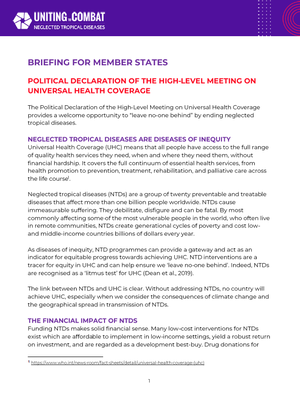Addressing neglected tropical diseases (NTDs) is critical to achieving universal health coverage (UHC) as these diseases disproportionately affect the most marginalised populations, perpetuating cycles of poverty and hindering socio-economic development. By tackling NTDs, a country strengthens its health systems, improves its capacity to deliver comprehensive healthcare, reduces disease burden and improves population health, and boosts multisectoral collaboration.
Fighting NTDs is also intricately linked to multiple Sustainable Development Goals (SDGs), ranging from poverty eradication to health improvement, education, gender equality, reduced inequalities, and partnerships.
By prioritising NTD control and elimination efforts, we can make significant strides towards achieving UHC and the broader global development agenda.
Arguments: NTDs and UHC
Neglected tropical diseases (NTDs) are a group of twenty-one preventable and treatable diseases that affect more than one billion people worldwide. NTDs cause immeasurable suffering. They debilitate, disfigure and can be fatal. By most commonly affecting some of the most vulnerable people in the world, who often live in remote communities, NTDs create generational cycles of poverty and cost low- and middle-income countries billions of dollars every year.
To combat these diseases, NTD programmes are delivering vital interventions to some of the world’s poorest and hardest-to-reach populations – sometimes representing a community’s first entry point to a health system. This includes training health workers to provide high-quality diagnosis and treatment, conducting disease surveillance, and encouraging referral to local health facilities. Moreover, decreasing the burden of NTDs frees up a country’s capacity to address other important health issues.
Universal health coverage (UHC) means that all people have access to the full range of quality health services they need, when and where they need them, without financial hardship. As diseases of inequity, NTD programmes can provide a gateway to and act as an indicator for equitable progress towards achieving UHC. By addressing NTDs, countries enhance their capacity to deliver comprehensive healthcare services to all, thereby strengthening the overall health system and improving healthcare coverage and equity.
As such, incorporating NTDs into the UHC agenda should be a political priority and offers numerous additional benefits: Addressing NTDs fosters multisectoral collaboration. Effectively combating NTDs requires coordination across various sectors such as nutrition, water, sanitation, and education. Integrating NTDs into the UHC agenda promotes partnerships and cooperation, allowing for a comprehensive and holistic approach to health, resulting in improved outcomes.
Incorporating NTDs into the UHC agenda also enables countries to further prioritize the prevention, diagnosis, and treatment of these diseases, alleviating the burden of NTDs, improving population health and enabling socio-economic development in impacted communities. Furthermore, fighting NTDs aligns with the global development agenda, including several Sustainable Development Goals (SDGs) related to health, poverty eradication, education, and gender equality. By incorporating NTDs into UHC policies and political decisions, countries contribute to the achievement of multiple SDGs, working towards sustainable development on a global scale and ensuring that no one is left behind.
Asks: NTDs and UHC
- Advocate for the WHO NTD service coverage index to be used as an indicator for equity on progress towards UHC. NTDs affect over one billion of the poorest and most marginalised communities. These are the populations that UHC was designed to help yet are most at risk of suffering from catastrophic out-of-pocket health expenditure, they are in the bottom billion. There is no better way for Member States to measure progress towards UHC than by measuring the coverage for NTDs. Furthermore, verifiable NTD coverage data is routinely collected from Member States by the WHO. By using NTD treatment coverage as an indicator for equitable access to health, it will give a truer picture of the coverage of UHC and the ability of countries to protect their underserved populations and help fulfil the goals of the SDGs and the WHO NTD roadmap 2030.
- Advocate for investments in primary healthcare (PHC) to achieve UHC. PHC is the backbone of health systems and should be structured to support the delivery of essential packages of care that prioritise underserved communities. It is recognised that 90% of essential interventions for UHC can be delivered through the PHC system. NTD interventions must form part of PHC and included in essential packages of care.
- Ensure that any new investments in UHC, prioritises investments in neglected tropical diseases. This should include investments in research, innovation and access, for vaccines, new drugs and diagnostics for neglected diseases. As of May 2024, 50 countries have eliminated at least one NTD and over 600 million fewer people required interventions than in 2010. Yet, despite these incredible impacts, NTD programmes are facing critical funding gaps that threaten progress to date. NTD programmes do not benefit from sustainable and predictable financing, relying on the goodwill of donors, threatening progress. It will be essential that any new investments to UHC prioritises NTDs.
- Commit to strengthen political leadership and country ownership of, and investment in, the fight against NTDs by accelerating the integration of NTD services and interventions within national health systems as a central component of UHC and endorse the Kigali Declaration on NTDs. The Kigali Declaration is a high-level, political declaration that is mobilising political will, community commitment, resources and action, and securing commitments needed to end the suffering caused by NTDs.
Earlier in 2023, a High-Level Meeting on UHC at the United Nations General Assembly took place. We produced a briefing to ensure that we “leave no-one behind” by ending neglected tropical diseases, which you can download below.

21 June 2023
